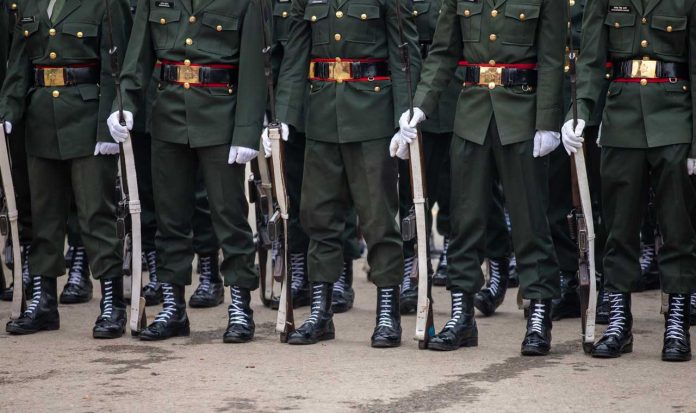By Jim Mauro
Thunder Bay – Opinion – Some of you are going to disagree, but I believe that once you have turned 14 years old, you should be required to fight for your country.
Canada and the US do not have a draft. Our two countries now operate on recruitment with a strong push by the US, to display military style celebrations at large sporting events. They have found it useful as a recruiting tool, flying jets over the Super Bowl or having family reunions planned to bring tears to the crowd. Take a knee? Not according to the “patriots” who often define patriotism but holding a beer and screaming during the national anthem at many sporting events. Nothing says “I love my country” then downing a cold one during the anthem.
Poverty is also a good thing for the military. Poor people assist in recruitment goals giving those without a strong financial future, a place to get a job. Some would argue the greater the number of poor people the better recruitment can be. During WWII, my father was going to enlist at sixteen, but his mother would not authorize it, a fortunate decision for my siblings and myself.
Given all that society has provided, is it too much to ask for 14-year-old men and women to do their part for our country? Yes, this may interfere with their high school education but graduating at 19 or 20 is a small price to pay. We may lose some of them because they have been deployed to zones of conflict but what is the difference if they are 18 or 14?
We have also heard a great deal about the shortage of trades people and workers in general so here is another idea. I think kids should have to decide at 14 or 15, what they want to do as a career. This allows the government to better plan where to put the resources necessary to meet the demands of our economy. Once you pick your profession, you are stuck with it for life.
Age is a determining factor for many things in our society. Sixteen to drive and depending on what jurisdiction you live in, anywhere from 19-21 to drink. I do find it ironic, especially in the US, that you can buy a machine gun at eighteen, but you are not responsible enough to drink. We can save that logic for a different article.
Eighteen is the magic number of being treated as an adult for voting. Until then, we will make decisions on spending, health, war, or society in general without any real impact from those under 18. This leads me to the real point of this article, if eighteen is the age of wisdom for politics, what is the age of wisdom for the child’s life.
The issue of gender identification has been front and centre it seems, for the past several years. It is being used as a wedge issue by both the political left and right. In the middle of all of this are children who are sometimes being used as political pawns when they are enduring difficulties in day-to-day life. But when is a child or young adult, old enough and mature enough to make life impacting decisions?
Gender dysphoria is a very common term often used to describe the problems some young adults are having in dealing with their biological birth. Now before I go any further, let me state categorically that I may get some terms wrong in this article, but I am hopeful the point of this piece is not about the very specifics of the topic, but more about the appropriateness of when an individual is old enough and mature enough to make these decisions on their own.
Would any parent or young person advocate be okay if a teacher took their class bungee jumping without parental approval. Would parents be fine if a teacher took a class white water rafting, again without parental knowledge or input. Society demands that parents be included in these decisions that impact their children’s lives. So why are there some who believe a parent should not be part of their children’s lives when the issue of gender transformation, or gender identity is an issue.
I understand that some parents or some families are not going to be supportive of their child facing these issues. There will be people out there who can say that had their parents been notified, things may have been worse for them individually. But no one would ever suggest that a child can be operated on at a hospital, at 14 or 15, without parental consent or knowledge. So why should we expect that when it comes to this issue, where life altering decisions can take place, that parents suddenly should be excluded from the process.
In searching for information for this piece, I came across an article that outlined the experience of a young girl (Eva) facing this challenge. According to Eva, she was experiencing gender dysphoria. The only option provided to her by those allegedly looking out for her best interests, was leaving home at sixteen, possibly forgoing the rest of her high school education and put on a path for gender transformation. The story captured Eva’s relief that at some point she stopped this process, came to the realization that she was attracted to women only and is happy to live a life as a woman.
Now, both sides of this debate can roll out individual stories that support their narrative. The people who hate seatbelts can show you the person who lived because they were not wearing one, ignoring the vast numbers that are saved because of them. The point of this analogy is to avoid being bogged down by the individual stories that support each side, and to concentrate on the larger issue of when is it appropriate for children, not old enough to vote, not old enough to drive, not old enough to drink but old enough to make serious choices on their own?
I read an article from the National Post that was incredibly balanced in covering this topic. On the parental exclusion side, were the arguments that schools need to be a safe place for these children, that being supported at school is good for their health, their feeling of safety and well being and that it impacts their attendance at school in a positive way.
The side that wants parents to be notified have a different argument when they are kept out of the loop of what is happening to their children. They argue teachers are not qualified in these areas, that the rates of transgender identification are increasing rapidly without any science to support that increase and that exposing children to these concepts early in life may cause some to believe that their “issues” are directly connected to gender identity, instead of other mental/medical reasons that may go away as they mature. So, what is the answer?
I fall on the side of the parent. Imagine for a moment that a teacher is aware that one of her students is taking enormous risks for their safety during school hours. Doing high risk maneuvers on a skateboard, smoking at thirteen, jumping in front of vehicles as a game, or any other activity that may involve injury or death. Would the teacher be duty bound to report this activity to school leaders and wouldn’t the parents be advised? Of course.
Now I realize that those “dangerous” activities are not quite the same, but at fourteen, fifteen, sixteen, are you really mature enough to make decisions about your life? Should anyone under the age of eighteen be prescribed drugs that stop the impact of puberty before the maturity arrives that comes with age and life experience. Put me down as a no on that side even though there is the argument that by slowing or stopping puberty with medication, the transformation to a different gender may be easier.
I cannot imagine the challenge of feeling like you are born into the wrong body so supporting these children to face their challenge until they are mature enough would seem to be a more preferred method of dealing with this issue. It is hard to imagine that very young adults, are mature enough to decide how they wish to live for the rest of their lives when they are not yet an adult. And so far, I was unable to locate any long-term data outlining what the ramifications may be to the physical and emotional health of the individual.
Like almost everything today, this has become political. Those on the left, push for the ability to have these children move forward in these processes to have their believed gender identity validated, often without parental knowledge. Those on the right are now passing laws preventing any support for these children and laying it all back on the family despite the reality that many parents fail miserably in the most basic passing of knowledge when it comes to sexuality. This is the reason schools have sex education as part of their curriculum. Republican led states are creating laws banning transgender support, the very thing these children need. It is at times, bizarre.
But in the middle of this political divide are real children with real challenges, may they be gender dysphoria or other mental or physical challenges that prevent them from being happy or content. But I find it hard to believe that the incredible increase in the children identifying as transgender is simply because society is becoming more tolerant of this issue. That would suggest that these trends should be taking place at approximately the same rates over multiple age categories when that appears to not be the case. It at least begs the question; are these children confusing gender identity with other medical/mental issues.
If there are peer reviewed large-scale studies that suggest the necessary methods to be employed, it would be a great help in this discussion but that appears to be a long way off. It seems for the moment people are using their best judgement and training in making recommendations most often on a case-by-case basis. But it does beg the question as to why some countries in Europe, long ahead of North America on many of these issues, are pulling back from this “support the child” approach and are proceeding more cautiously. It seems there is not enough scientific evidence to support one approach over another.
Some of these individuals even end up in court, when one parent supports the transition, and another parent does not. In one case, the court ruled that the father had no say in what his 14-year-old child could do, and the child was free to pursue gender transitioning with the support of their mother. I have a concern when these serious medical issues are being decided by a judge with zero medical training or knowledge. These issues could come down to simply who had the best lawyer.
In one of the articles referenced earlier, a grade 6 student in Calgary came out as Transgender and the teacher instructed the students to make sure the parents were not notified. Are parents okay with this information being kept from them and having a teacher or school system making that decision? What other decisions can a school make without notifying parents? This policy assumes that the child is aware of what the reaction of parents would be in this situation, an idea that seems beyond the wisdom of most 11 or 12-year-olds.
I am of the view that most parents would support their child with love and affection. It strikes me that the majority of parents, would demonstrate caring and compassion. My young cousin had a friend going through this very issue who was supported by their parents to appear less like the gender they were born with. But the parents stopped any medical or drug treatment from taking place until their child was several years older. That child is now dating someone of the opposite sex and no longer has “these feelings of being in the wrong body”.
It seems these policies are based on what the worst reaction by parents would be instead of what I believe would be the majority reaction, one of support and compassion. There are bad doctors, but most are very good. There are bad lawyers, but most are very good. Why would parents be any different?
The medical field has been moving forward in this area to support those children or young adults who feel trapped in the body they were born with, but it is clearly not an exact science. Many are simply trying to deal with a complicated issue as best they can, and I wish nothing but the best to those who make the difficult decisions to move forward with transitioning.
However, this policy of leaving it up to very young people to “know” what is best when most of their life is still ahead of them is of deep concern to many. I find it difficult to square the circle that parents who are responsible for their children by law, can be excluded from participating in what can only be described as a very serious issue.
In 1942 my grandmother said no to my father in his quest to go to war. In 2023, would she have the same ability. Well for war yes, for gender identity or transitioning, likely not. Some view that as progress, others do not. Perhaps my 16-year-old father felt it was necessary to defend freedom or because there were no jobs available. Was he mature enough at 16 to know the reality of war? I am not sure a 16-year-old, should be making decisions like this on their own. Parents need to be a part of their children’s lives and policy should not be created because some parents are not as supportive as some people believe they should be.
I cannot fathom the difficulty of feeling like you are in the wrong body. But that should not mean that parents are excluded from actively being part of their child’s life when this situation exists. Not every parent will get it right but that should not be what drives policy.
You cannot begin to drive until you are 16, vote at 18 or drink until at least 19. If your child was accused of committing a crime, a parent must be notified if they are under 18, so why would this situation be so unique as to exclude parental participation.
Leaving serious medical/social/mental health decisions to teachers and physicians without parental knowledge is a step too far in my view no matter how ultraistic the motivation. I find it hard to believe that any parent would not want to know about their child facing an enormous issue. Making a policy that excludes parents, is simply a bad one. Just a thought







